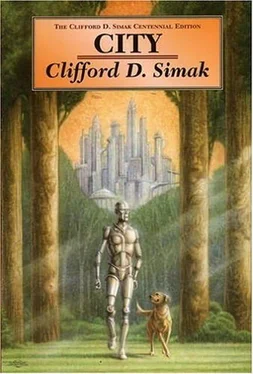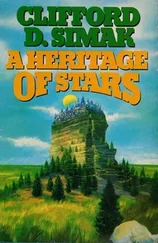Clifford Simak - City
Здесь есть возможность читать онлайн «Clifford Simak - City» весь текст электронной книги совершенно бесплатно (целиком полную версию без сокращений). В некоторых случаях можно слушать аудио, скачать через торрент в формате fb2 и присутствует краткое содержание. Жанр: Фантастика и фэнтези, на английском языке. Описание произведения, (предисловие) а так же отзывы посетителей доступны на портале библиотеки ЛибКат.
- Название:City
- Автор:
- Жанр:
- Год:неизвестен
- ISBN:нет данных
- Рейтинг книги:3 / 5. Голосов: 1
-
Избранное:Добавить в избранное
- Отзывы:
-
Ваша оценка:
- 60
- 1
- 2
- 3
- 4
- 5
City: краткое содержание, описание и аннотация
Предлагаем к чтению аннотацию, описание, краткое содержание или предисловие (зависит от того, что написал сам автор книги «City»). Если вы не нашли необходимую информацию о книге — напишите в комментариях, мы постараемся отыскать её.
City — читать онлайн бесплатно полную книгу (весь текст) целиком
Ниже представлен текст книги, разбитый по страницам. Система сохранения места последней прочитанной страницы, позволяет с удобством читать онлайн бесплатно книгу «City», без необходимости каждый раз заново искать на чём Вы остановились. Поставьте закладку, и сможете в любой момент перейти на страницу, на которой закончили чтение.
Интервал:
Закладка:
"I've been thinking about it," Peter told him, quietly. "Maybe a bag of some sort to hang around my shoulder."
They went on up the hill.
"What are you going to do when you get to Webster House?" asked Lupus.
"I'm going to see Jenkins," Peter said. "I'm going to tell him what I've done."
"Fatso's already told him."
"But maybe he told him wrong. Maybe he didn't tell it right. Fatso was excited."
"Lame– brained, too," said Lupus.
They crossed a patch of moonlight and plunged on up the darkling path.
"I'm getting nervous," Lupus said. "I'm going to go back. This is a crazy thing you're doing. I've come part way with you, but-"
"Go back, then," said Peter bitterly. "I'm not nervous. I'm-"
He whirled around, hair rising on his scalp.
For there was something wrong – something in the air he breathed, something in his mind – an eerie, disturbing sense of danger and, much more than danger, a loathsome feeling that clawed at his shoulder blades and crawled along his back with a million prickly feet.
"Lupus!" he cried. "Lupus!"
A bush stirred violently down the trail and Peter was running, pounding down the trail. He ducked around a brush and skidded to a halt. His bow came up and with one motion be picked an arrow from his left hand, nocked it to the cord.
Lupus was stretched upon the ground, half in shade and half in moonlight. His lip was drawn back to show his fangs. One paw still faintly clawed.
Above him crouched a shape. A shape – and nothing else. A shape that spat and snarled a stream of angry sound that screamed in Peter's brain. A tree branch moved in the wind and the moon showed through and Peter saw the outline of the face – a faint outline, like the half erased chalk lines upon a dusty board. A skull-like face with mewling mouth and slitted eyes and ears that were tufted with tentacles.
The bow cord hummed and the arrow splashed into the face – splashed into it and passed through and fell upon the ground. And the face was there, still snarling.
Another arrow nocked against the cord and back, far back, almost to the ear. An arrow driven by the snapping strength of well-seasoned straight-grained hickory-by the hate and fear and loathing of the man who pulled the cord.
The arrow spat against the chalky outlines of the face, slowed and shivered, then fell free.
Another arrow and back with the cord. Farther yet, this time. Farther for more power to kill the thing that would not die when an arrow struck it. A thing that only slowed an arrow and made it shiver and then let it pass on through.
Back and back – and back. And then it happened. The bow string broke.
For an instant, Peter stood there with the useless weapon dangling in one hand, the useless arrow hanging from the other. Stood and stared across the little space that separated him from the shadow horror that crouched across the wolf's grey body.
And he knew no fear. No fear, even though the weapon was no more. But only flaming anger that shook him and a voice that hammered in his brain with one screaming word:
KILL-KILL-KILL
He threw away the bow and stepped forward, hands hooked at his side, hooked into puny claws.
The shadow backed away – backed away in a sudden pool of fear that lapped against its brain – fear and horror at the flaming hatred that beat at it from the thing that walked towards it. Hatred that seized and twisted it. Fear and horror it had known before – fear and horror and disquieting resignation – but this was something new. This was a whiplash of torture that seared across its nerves, that burned across its brain.
This was hatred.
The shadow whimpered to itself – whimpered and mewed and backed away and sought with frantic fingers of thought within its muddled brain for the symbols of escape.
The room was empty – empty and old and hollow. A room that caught up the sound of the creaking door and flung it into muffled distances, then hurled it back again. A room heavy with the dust of forgetfulness, filled with the brooding silence of aimless centuries.
Jenkins stood with the door pull in his hand, stood and flung all the sharp alertness of the new machinery that was his body into the corners and the darkened alcoves. There was nothing. Nothing but the silence and the dust and darkness. Nor anything to indicate that for many years there had been anything but silence, dust and darkness. No faintest tremor of a residuary thought, no footprints on the floor, no fingermarks scrawled across the table.
An old song, an incredibly old song – a song that had been old when he had first been forged, crept out of some forgotten corner of his brain. And he was surprised that it still was there, surprised that he had ever known it – and knowing it, dismayed at the swirl of centuries that it conjured up, dismayed at the remembrance of the neat white houses that had stood upon a million hills, dismayed at the thought of men who had loved their acres and walked them with the calm and quiet assurance of their ownership.
Annie doesn't live here any more.
Silly, said Jenkins to himself. Silly that some absurdity of an all-but-vanished race should rise to haunt me now. Silly.
Annie doesn't live here any more.
Who killed Cock.Robin? I, said the sparrow He closed the door behind him and walked across the room.
Dust– covered furniture stood waiting for the man who had not returned. Dust-covered tools and gadgets lay on the table tops. Dust covered the titles of the rows of books that filled the massive bookcase.
They are gone, said Jenkins, talking to himself. And no one knew the hour or the reason of their going. Nor even where they went. They slipped off in the night and told no one they were leaving. And sometimes, no doubt, they think back and chuckle – chuckle at the thought of our thinking that they still are here, chuckle at the watch we keep against their coming out.
There were other doors and Jenkins strode to one. With his hand upon the latch he told himself the futility of opening it, the futility of searching any further. If this one room was old and empty, so would be all the other rooms.
His thumb came down and the door came open and there was a blast of heat, but there was no room. There was desert – a gold and yellow desert stretching to a horizon that was dim and burnished in the heat of a great blue sun.
A green and purple thing that might have been a lizard, but wasn't, skittered like a flash across the sand, its tiny feet making the sound of eerie whistling.
Jenkins slammed the door shut, stood numbed in mind and body.
A desert. A desert and a thing that skittered. Not another room, not a hall, nor yet a porch – but a desert.
And the sun was blue – blue and blazing hot.
Slowly, cautiously, he opened the door again, at first a crack and then a little wider.
The desert still was there.
Jenkins slammed the door and leaned with his back against it, as if he needed the strength of his metal body to hold out the desert, to hold out the implication of the door and desert.
They were smart, he told himself. Smart and fast on their mental feet. Too fast and too smart for ordinary men. We never knew just how smart they were. But now I know they were smarter than we thought.
This room is just an anteroom to many other worlds, a key that reaches across unguessable space to other planets that swing around unknown suns. A way to leave this earth without ever leaving it – a way to cross the void by stepping through a door.
There were other doors and Jenkins stared at them, stared and shook his head.
Читать дальшеИнтервал:
Закладка:
Похожие книги на «City»
Представляем Вашему вниманию похожие книги на «City» списком для выбора. Мы отобрали схожую по названию и смыслу литературу в надежде предоставить читателям больше вариантов отыскать новые, интересные, ещё непрочитанные произведения.
Обсуждение, отзывы о книге «City» и просто собственные мнения читателей. Оставьте ваши комментарии, напишите, что Вы думаете о произведении, его смысле или главных героях. Укажите что конкретно понравилось, а что нет, и почему Вы так считаете.











